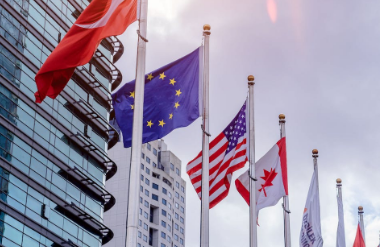Ciencia Política y
Estudios Internacionales
—
Una sólida formación multidisciplinaria para analizar problemáticas complejas en un contexto cambiante.
En los medios

Colombia and the plebiscite: the peace that wasn’t
"La paz en Colombia está entrando en un laberinto impredecible. Tal vez este es el momento adecuado para el compromiso internacional, que se mostró con tanta fuerza en la fase inicial de las negociaciones de paz y la firma del acuerdo de Cartagena, que renovarse de manera decisiva", consideró el profesor del Departamento de Ciencia Política y Estudios Internacionales.
After 52 years, four months and five days of an armed conflict that has left more than 8 million victims, Colombians rejected in a plebiscite (50.2% vs. 49.7%) the commitment to peace agreed by the Colombian government and the Revolutionary Armed Forces of Colombia (FARC).
How are we
to understand such a paradoxical and unexpected result? I will try to outline
some hypotheses. First, the Colombian political system is currently
experiencing serious representation problems, as shown in the recurring low
levels of participation. Just 37.4% of the 34.899.945 Colombians eligible to
vote went to the polls on October, 2nd - only 13.066.047 people did vote. There
were fewer voters than in the first rounds of the presidential elections in
2010 (14.781.020) and in 2014 (13.209.561). And the percentage of those not
voting at the referendum (63.6%) was the second highest since the first round
of the presidential elections (66.3%) of 1994. It is important to acknowledge
that only a segment of the Establishment—a relatively more modern one—has been
opened to dialogue and negotiation with a severely weakened but not completely
defeated insurgency. The most traditional and conservative sector of the
Establishment expected and favored the rendition of the FARC.
Second, the
electorate faced enormous difficulties to know and understand in any depth the
content of what was being voted. The document backing the signing of the peace
between the Colombian government and the M-19 guerrillas in March 1990 was four
pages long. The text signed with the FARC has 297 pages. The former was an
agreement. The latter is a treaty. Comparative literature on plebiscitary
campaigns indicates that the key to obtain a favourable vote of the population
is to have sufficient time to educate the voters, to communicate in a coherent
way, to encourage citizen involvement and to reach the undecided. None of this
happened this time, despite the fact that it was essential - considering the
complexity and the ambition of the text - that the vast majority of Colombians
comprehend and assimilate why they should vote yes.
Third, the
deployment of relatively scarce resources, the campaign style and the strong
rhetorical arguments of the supporters of the “no” vote should be acknowledged.
The government-FARC commitment is precise and comprehensive, but its opponents
managed to oversimplify and shrink it. The key strategy of the “no” promoters
was to avoid explaining the agreement and to stress the question of
indignation. The idea was not to debate rational pros and cons arguments but
the accentuate passionate sentiments such as resentment against the FARC and
anger against the government.
On
agricultural matters, for example, the agreement proposes the drawing up of a
rural land census (the last dates back to 1954), the creation of a
three-million hectares land fund to be allocated to peasants for free, the
establishment of a massive program to regularize property (totaling seven
million hectares) aimed at small and medium producers, and the reduction of
rural poverty by 50% in the next 10 years. On political matters, the agreement
states that the FARC is to abandon its project of seizing power by the force of
arms and to become a political movement, once full disarmament is completed.
One of the incentives to access legality is the granting of a minimum of five
senators and five representatives (MPs) to the FARC, from 2028 till 2026, out
of a Congress composed of 102 senators and 166 representatives. On drug
trafficking, the FARC commits itself to putting an end to “any relationship
which may have been forged with this phenomenon during the rebellion”. And on
justice, the agreement includes a truth commission, a unit to identify missing
persons, and a special jurisdiction for peace and repair within the framework
of a transitional legal system, fully backed by the International Criminal
Court.
The
opponents of the agreement focused their attacks on their allegation that the
FARC would remain linked to the drug business and would also enjoy total
impunity. In addition references were made with respect to the political
benefits for the guerrillas and the defense of private property. Neither one
nor the other follows from what was signed. Opponents, however, especially
former President Álvaro Uribe, used a direct and simple language that the
advocates of the “yes” vote could not counteract with the same synthetic
precision. Instead of appearing as defending arguments that perpetuate
polarization and confrontation, opponents managed to convey the idea that their
purpose was to improve what had been signed and to ensure peace for the future.
In the end, a well-mobilized minority was able to defeat the dreams of peace of
another minority while a large majority remained indifferent: the total “no”
vote represented only 18.4% of the eligible voters.
Fourth,
errors made by President Santos and his low popularity should also be
considered. Santos took the risky option of submitting the agreement to a
plebiscite, although recent comparative experience was not very encouraging.
Guatemala reached a peace agreement in 1996, but the referendum held in 1999,
which could have opened the way to major constitutional reforms, was rejected
by 91.8% of the voters, and voter turnout was just 18.6%. Also in 1999, a hasty
referendum in East Timor, which was voted positively, prompted a brutal
reaction from the Indonesian government, resulting in thousands of casualties
and refugees. In 2004, the referendum for the reunification of Cyprus was
rejected by 75.8% of the Greek Cypriots, with 89.1% voter turnout. Santos had
no political, domestic or international obligation to call a plebiscite, but he
did because of the legal commitment he decided to sponsor prior to the end of
the negotiations. When the time came to vote Colombians severely question his
public policies on fighting corruption, security, employment and health. The
conjunction between a president with low approval ratings and the persistent
rejection of the FARC by a substantial part of the population contributed to
weakening support for the plebiscite. It is worth recognizing that plebiscites
are both “issue” oriented and “contextually” implemented. The issue at stake is
crucial but the context is many times more fundamental. A combination of a very
intricate peace agreement and a negative conjuncture for the political
leadership is a recipe for disaster.
In short, peace in Colombia is now entering an unpredictable labyrinth. Perhaps this is the right time for international commitment, which showed itself so forcefully in the initial phase of the peace talks and the signing of the agreement in Cartagena, to be renewed decisively. Maybe that only a mixture of active mass mobilization from bellow and strong external support from outside can revitalize the peace process.
Conocé nuestros programas
Nuestra oferta académica está diseñada para formar profesionales capaces de liderar en ámbitos académicos, políticos y sociales.


Aprendé con
los mejores
Nuestro cuerpo docente se distingue por su rigurosa formación doctoral en las universidades más prestigiosas del mundo. Su alta dedicación y su conocimiento y experiencia internacional los habilitan para desempeñarse exitosamente en distintos ámbitos y proveer a los/as estudiantes de una sólida formación multidisciplinaria.
en Argentina para dictar
clases de grado y posgrado.
Fuente: Ranking Teaching, Research and International Policy (TRIP) International Relations Survey, 2014.
La Di Tella está entre las 150 mejores universidades del mundo en el área de Ciencia Política.
(Fuente: QS World University Rankings 2023)
Conocé a nuestro cuerpo docente

Jennifer Cyr
Ph.D. in Political Science, Northwestern University.

Sebastián Etchemendy
Ph.D. in Political Science, University of California at Berkeley.

Enrique Peruzzotti
Ph.D. in Sociology, New School for Social Research.

Catalina Smulovitz
Ph.D. in Political Science, The Pennsylvania State University.

Hayley Stevenson
Ph.D. in International Relations, University of Adelaide.

Juan Carlos Torre
Docteur en Sociologie, École des Hautes Études en Sciences Sociales.
Novedades
Reuniones informativas
Agenda
Cátedras y centros de investigación
Un espacio académico para el análisis, conocimiento y difusión del país de manera integral. Tiene el propósito de establecer un ámbito plural desde el cual enriquecer el diálogo entre Argentina y Colombia.
Una iniciativa conjunta de la Universidad Torcuato Di Tella, la Embajada de Francia en Argentina y el Instituto Franco Argentino que tiene por objetivo promover el intercambio académico y el diálogo.
de cambios en Cuba
El proyecto "Tiempo de cambios y el nuevo rol de las fuerzas armadas en Cuba" busca informar a actores que sean disidentes y críticos de las fuerzas armadas revolucionarias de Cuba (FAR) de dos maneras diferentes.
Departamento de Admisiones
Contacto


